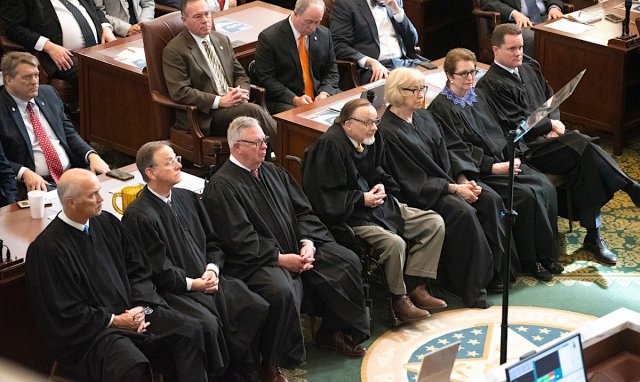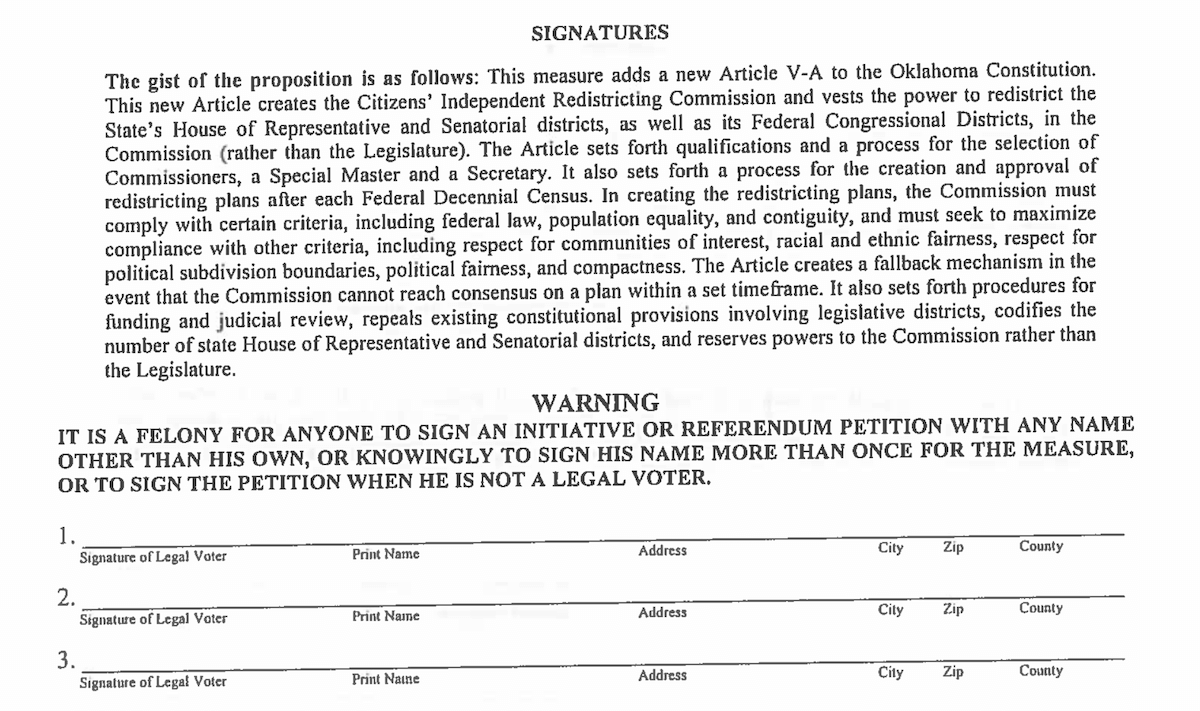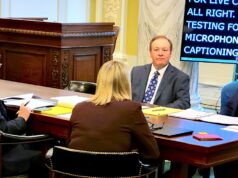

If it wants to change the way Oklahoma apportions its legislative and congressional districts after the 2020 U.S. Census, the group People Not Politicians will have to refile its initiative petition. In a ruling today, the Oklahoma Supreme Court invalidated the language of State Question 804 on grounds that its summary provided to citizens was not “sufficiently informative to reveal its design and purpose.”
“We find the gist fails to alert potential signatories about the true nature of the proposed constitutional amendment,” the majority opinion concluded. “The gist is not subject to amendment by this court, and as a result, the only remedy is to strike the petition from the ballot.”
The majority opinion, written by Justice Doug Combs, was concurred with by seven other justices, although Justice James Edmondson dissented in part. Justice John Reif dissented in full.
Arguments regarding two challenges to Initiative Petition 420 — which would have become State Question 804 — were heard Tuesday, Jan. 21. The other challenge was denied by the court.
Robert McCampbell and Travis Jett of the law firm Gable Gotwals argued the challenge in court.
“We are pleased that the Supreme Court ordered that petition 420 be stricken from the ballot,” McCampbell said in the statement. “The proposed redistricting commission would be selected without regard to the will of the voters. The people of Oklahoma should not be asked to sign a petition without knowing the relevant facts.”

Redistricting proposal panned by #okleg leaders
Andy Moore, executive director of People Not Politicians, said in an emailed statement that his organization will refile its proposal to create an independent redistricting commission.
“We appreciate the court recognizing what we knew to be true all along — that our petition is constitutional. While this ruling changes nothing about our movement, we will follow the court’s helpful guidance in rewriting the gist and we will refile our petition immediately,” Moore said. “Oklahoma voters deserve the chance to vote on this measure and end partisan gerrymandering once and for all.”
The “gist” refers to a required summary of the proposal displayed to citizens during the signature-gathering process.
Moore’s group launched its redistricting ballot initiative in October, arguing that the current legislative-controlled redistricting process for congressional and legislative maps is “an election in reverse.”
“The way the system is now, it allows politicians to draw their own districts and, in effect, pick their own voters. That’s an election in reverse,” Moore said at the time. “We elect them, but when it comes to the redistricting process, they are the ones picking their own voters. That’s not fair, it’s not right.”
Legislative leaders, however, have criticized Moore’s proposal and have tried to connect the group to national redistricting efforts by Democrats.
“I’m pleased with the court’s ruling,” Senate President Pro Tempore Greg Treat (R-OKC) said in a statement Tuesday. “This is nothing more than a power grab by out-of-state liberal activists. As I have said before, the Senate will handle this job in a professional and thorough manner. The Senate will announce more details soon about its redistricting process.”
House Speaker Charles McCall (R-Atoka) also panned the redistricting proposal in October.
“This petition is a solution in search of a problem in a state like Oklahoma that has not had problems with or successful lawsuits over its redistricting process. The convoluted 14-page process the petitioners want makes the system more complicated and less accountable to voters,” McCall said.
State Question 804 would have amended the Oklahoma Constitution, meaning it would have needed about 178,000 valid signatures from registered voters to make a 2020 ballot.
Group refiles petition with new gist
Early Thursday, Feb. 6, Moore’s group announced it had refiled the petition with a new gist:
The gist of the proposition: This measure adds a new Article to the Oklahoma Constitution, intended primarily to prevent political gerrymandering. The Article creates a Citizens’ Independent Redistricting Commission, and vests the power to redistrict the state’s House, Senatorial, and federal Congressional districts in the Commission (rather than the Legislature). The 9-member Commission will consist of 3 members from each of 3 groups, determined by voter registration: those affiliated with the state’s largest political party; those affiliated with its second-largest party; and those unaffiliated with either. Commissioners are not elected by voters but selected according to a detailed process set forth by the Article: in brief, a panel of retired judges and justices designated by the Chief Justice of the Oklahoma Supreme Court will choose pools of approximately 20 applicants from each group, then randomly select 3 Commissioners from each pool. The Article sets forth various qualifications for Commissioners, Special Master, and Secretary, intended to avoid conflicts of interest (for example, they cannot have changed party affiliation within a set period, and neither they nor their immediate family may have held or been nominated for partisan elective office or served as paid staff for a political party or as a registered lobbyist in the last five years). It also sets forth a process for the creation and approval of redistricting plans after each federal Decennial Census, including, among other things, a method for counting incarcerated persons, public notice, and open meeting requirements. In creating the plans, the Commission must comply with federal law, population equality, and contiguity requirements, and must seek to maximize respect for communities of interest, racial and ethnic fairness, political fairness, respect for political subdivision boundaries, and compactness (in order of priority), without considering the residence of any legislator or candidate or a population’s political affiliation or voting history except as necessary for the above criteria. The Article creates a fallback mechanism by which the state Supreme Court, using a report from the Special Master, will select a plan if the Commission cannot reach the required level of consensus within a set timeframe. It also sets forth procedures for funding and judicial review, repeals existing constitutional provisions involving legislative districts, codifies the number of state House and Senatorial districts, and reserves powers to the Commission rather than the Legislature. Please review attached Petition for further details.
Read the Oklahoma Supreme Court decision
https://nondoc.com/wp-content/uploads/2020/02/Redistricting-Ballot-initiative.pdf” height=”450px” download=”all”](Update: This story was updated at 2 p.m. Tuesday, Feb. 4, to include comment from Moore when it became available. It was updated again at 10:35 a.m. Thursday, Feb. 6, to include the new gist proposed in People Not Politicians’ refiling.)




















